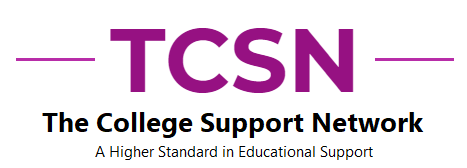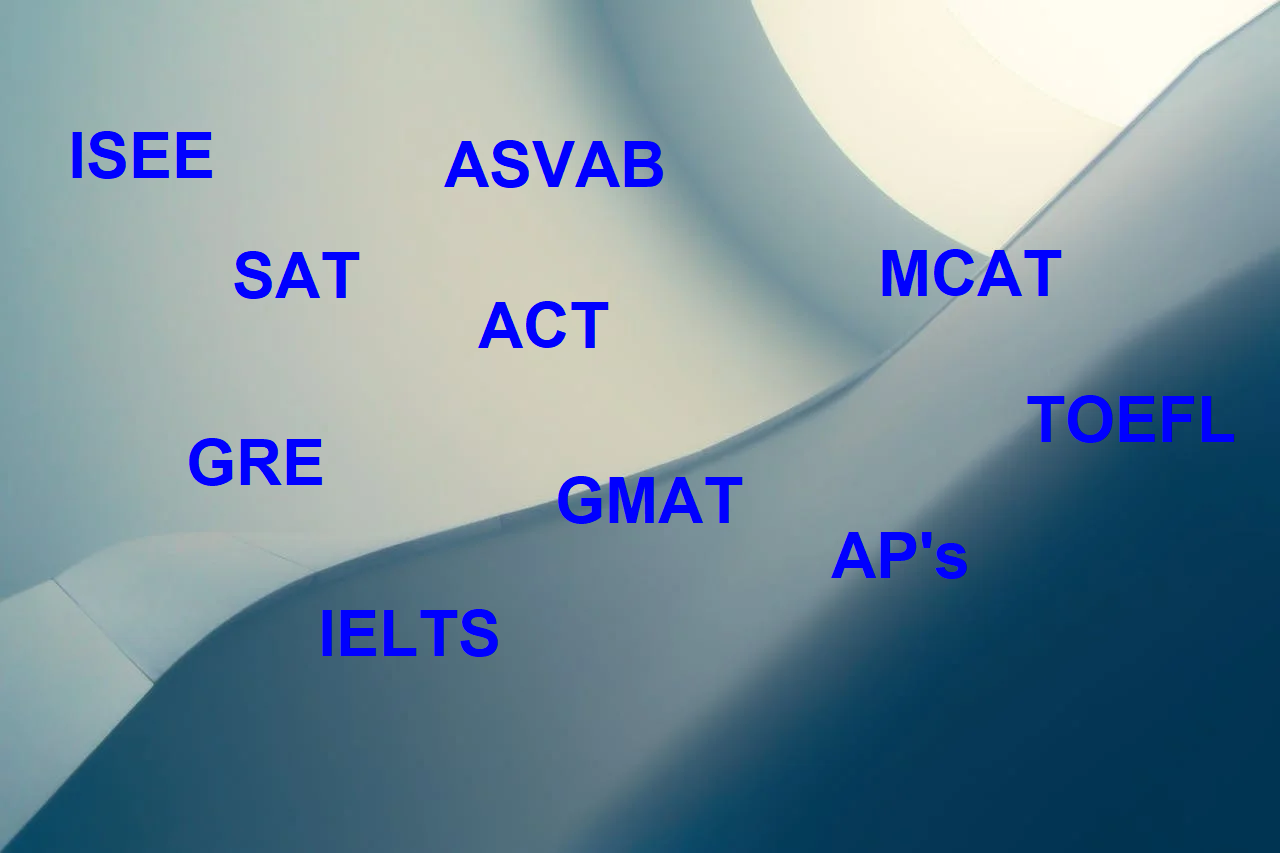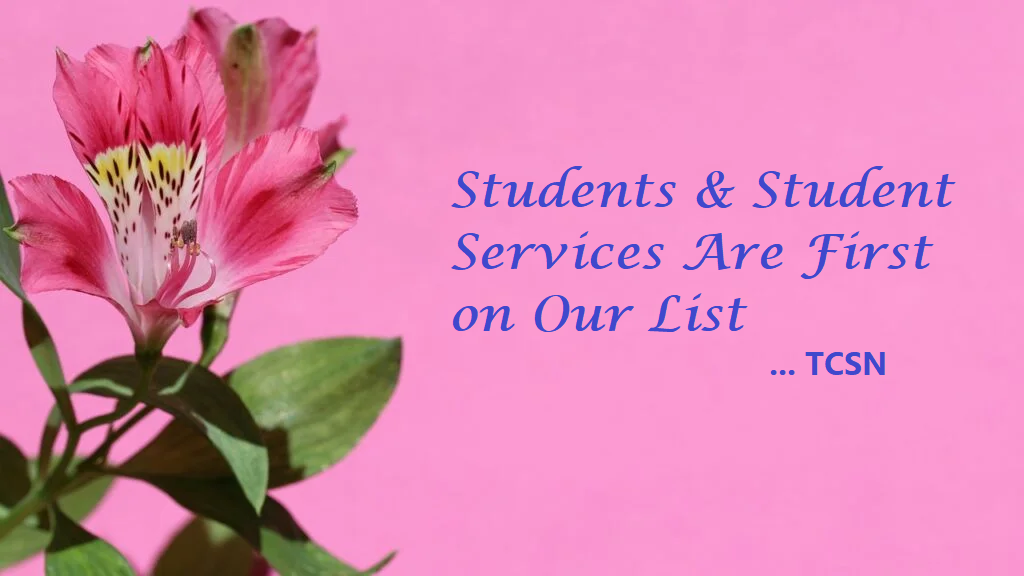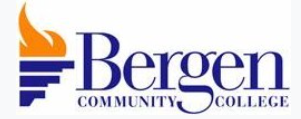Tuition


| Mathematics | Science | Business |
|---|---|---|
| Algebra | Biology | Accounting |
| Calculus | Chemistry | Finance |
| Statistics | Physics | Economics |
Professional Tutoring
Tutoring That Works for & Benefits Students
OUR professional tutoring serves as a valuable resource for students seeking to enhance their academic performance, develop essential skills, and build confidence in their abilities. OUR personalized approach ensures that educational support is effectively aligned with each student’s unique needs and goals/objectives. WE provide flexible, convenient and affordable options for students.
Overview of TCSN Tuition
- Personalized Instruction: Tailored learning and flexible pace (Students progress at their own pace).
- Expertise and Specialized Knowledge: Students are tutored by highly trained professional educators.
- Subject Matter Expertise: OUR tutors are often experts in their fields.
- Up-to-Date Methods: Tutors stay current with educational trends and methodologies.
- Improved Academic Performance: Focused assistance helps students understand complex concepts, improve problem-solving skills, and enhance overall academic performance.
- Homework Help: OUR tutors provide guidance on homework and projects, helping students develop effective study habits and time management skills.
- Confidence Building: Regular positive reinforcement and supportive feedback help boost students’ self-confidence, motivation and can alleviate academic stress and anxiety.
- Enhanced Study Skills: OUR Tutors encourage critical thinking and problem-solving skills.
- Critical Thinking & Study Techniques: OUR tutors teach effective study strategies, note-taking skills, and exam preparation techniques as well as encourage critical thinking and problem-solving skills that are applicable across various subjects and real-life situations.
- Advanced and Enrichment Opportunities: In addition to remedial support, tutoring can offer enrichment opportunities for advanced learners seeking to deepen their knowledge.
- Research and Analytics: Measure your personal or business performance based on facts. We crunch the numbers and present you with reliable information upon which you can make educated decisions. Make decisions with confidence.
Benefits of TCSN Tuition
Individualized Attention: Each student receives focused, one-on-one instruction that is tailored to their unique needs, which is often not possible in a classroom setting. Students may also elect to be tutored in small groups at reduced rates.
Enhanced Understanding: Personalized explanations and targeted practice help students grasp difficult concepts and retain information more effectively.
Improved Performance: With support and guidance, students often see improvements in grades, test scores, and overall academic performance.
Development of Lifelong Skills: Beyond subject-specific knowledge, tutoring helps develop critical thinking, problem-solving, and effective study habits that benefit students throughout their educational journey and in their personal lives.
Motivation and Engagement: Personalized, practical and engaging lessons increase students’ interest in the subject matter and their environment, fostering a positive attitude towards learning and aspiring to .
.Mathematics.
Algebra We Tutor
*********
Definition
Algebra is a fundamental area of mathematics that involves working with symbols and equations to solve problems. It starts with basic concepts like variables and expressions, moves through more complex topics such as polynomials and quadratic equations, and extends to advanced ideas like functions and inequalities. Mastering algebra provides essential skills for higher mathematics and various real-life applications.
Algebra
Strengthen Your Algebra > Pass Your Exams
- Pre-College Algebra
- Introductory College Algebra
- Intermediate Algebra
- Abstract Algebra
- Linear Algebra
- Algebraic Geometry
- Pre-Calculus
Mathematics–Algebra
MATH: Pre-College Algebra (MPCA)
Pre-college algebra, often called “pre-algebra,” is a foundational course designed to prepare students for algebra and other higher-level mathematics. Typical Topics Covered: Basic Arithmetic Operations. Factors and Multiples. Fractions and Decimals. Ratios and Proportions. Percentages. Basic Algebraic Concepts. Geometry Basics. Coordinate Systems. Words Problems. Patterns and Sequences. If your course or academic needs fall into this category, we can assist.
| $25/ hour | Request a Tutor |
MATH: Introductory College Algebra (MICA)
Introductory College Algebra, typically, is a course designed to build on pre-algebra concepts and prepare students for more advanced algebra courses and other college-level math. Typical Topics Covered: Working with Integers. Functions and Their Properties. Linear Functions and Equations. Polynomials. Factoring Techniques. Systems of Linear Equations. Quadratic Functions and Equations and more. If your course or academic needs fall into this category, sign up for tutoring now.
| $30/ hour | Request a Tutor |
MATH: Intermediate Algebra (MINCA)
Intermediate Algebra is a course designed to build on the foundations established in introductory algebra and to prepare students for more advanced mathematical studies. It typically covers a range of topics in greater depth, often including: Advanced Polynomial Operations. Advanced Factoring Techniques. Complex Numbers. Exponential and Logarithmic Functions. Conic Sections. More Complex Functions and Their Graphs. Applications. If your course or academic needs fall into this category, you are more than likely to need our help. Sign up for tutoring.
| $35/ hour | Request a Tutor |
MATH: Pre-Calculus (MPC)
Pre-Calculus is a mathematical course designed to prepare students for calculus and other higher-level math courses. It covers a range of topics that bridge the gap between algebra and calculus. Common Topics include: Functions and Their Properties: Linear, quadratic, polynomial, rational, exponential, logarithmic, trigonometric and piecewise functions. Analytical Geometry. Limits and Continuity. Mathematical Modeling and more. If your course or academic needs fall into this category, you are more than likely to need our help. Sign up for tutoring.
| $40/ hour | Request a Tutor |
MATH: Abstract Algebra (MAA)
Abstract Algebra is a branch of mathematics that studies algebraic systems in a broad, theoretical manner. fundamental to many areas of mathematics and has applications in fields like cryptography, coding theory, and quantum mechanics. Topics include: Groups. Rings. Fields. Algebras. Homomorphisms and Isomorphisms and more. Sign up for tutoring in this area if your course or academic needs fall into this category.
| $50/ hour | Request a Tutor |
MATH: Linear Algebra (MLA)
Linear Algebra is a branch of mathematics focused on vector spaces and linear mappings between these spaces. It provides a framework for solving systems of linear equations and has applications in various fields such as engineering, physics, computer science, business and economics Typical Topics include: Vectors and Vector Spaces. Matrices. Eigenvalues and Eigenvectors. Orthogonality. Linear Transformations and more. Slated as one of our specialties, we are here to assist if you need a professional and knowledgeable tutor in this area.
| $50/ hour | Request a Tutor |
MATH: Algebraic Geometry (MAG)
Algebraic Geometry is a branch of mathematics that studies geometric properties and structures through the use of algebraic techniques, particularly polynomial equations. It blends concepts from algebra and geometry to explore the solutions to systems of polynomial equations and their geometric interpretations. Call us.
| Call Us | Request a Tutor |

TCSN CUSTOMER SUPPORT
Receive timely answers to your Questions in FAQ

Calculus We Tutor
*********
Definition
Calculus is a branch of mathematics that deals with rates of change and accumulation of quantities. Differential calculus focuses on derivatives and their applications, such as optimization and curve sketching. Integral calculus deals with integrals and their applications, including finding areas and volumes. Multivariable calculus extends these concepts to functions of several variables, and differential equations involve solving equations that include derivatives.
Calculus
Our Advanced Mathematics Specialties
- Differential Calculus
- Integral Calculus
- Calculus I & II
- Calculus III (Multivariable)
- Differential Equations
- Advanced Calculus
Mathematics–Calculus
MATH: Differential Calculus (MDC)
Differential Calculus is a branch of calculus focused on the concept of the derivative, which measures how a function changes as its input changes. It is fundamental to understanding rates of change, optimizing functions, and modeling real-world phenomena. Typical Topics include: Limits and Continuity. Differentiation and the Rules of Derivatives. Higher-Order Derivatives. Mean Value Theorem. Implicit Differentiation. Taylor and Maclaurin Series and more. A designated specialty, we are here to assist if you need a professional and knowledgeable tutor in this area.
| $40/ hour | Request a Tutor |
MATH: Integral Calculus (MIC)
Integral Calculus is a branch of calculus that focuses on the concept of the integral, which represents accumulation of quantities and the area under curves. It is concerned with finding the total accumulation of a quantity given its rate of change and has applications in areas such as physics, engineering, and economics. Typical Topics include: Indefinite Integrals (Antiderivatives). Definite Integrals and Integration Techniques. Multivariable Integration. Special Functions and Series. A designated specialty, we are here to assist if you need a professional and knowledgeable tutor in this area.
| $40/ hour | Request a Tutor |
MATH: Calculus I (MCLC1)
Calculus I is an introductory couLCrse in calculus that typically covers fundamental concepts related to limits, derivatives, and integrals. It lays the groundwork for more advanced topics in calculus and mathematical analysis. Topics are similar to MDC (above) plus the fundamentals of integrals included. A designated specialty, we are here to assist if you need a professional and knowledgeable tutor in this area.
| $40/ hour | Request a Tutor |
MATH: Calculus II (MCLC2)
Calculus II is the second course in a standard calculus sequence, building on the foundational concepts covered in Calculus 1. It typically extends the study of integration and explores advanced techniques and application. Typical Topics include: Advanced Integration Techniques. Applications of Integration. Sequences and Series. Polar Coordinates and Parametric Equations. Vector Calculus (Introduction) and more. A designated specialty, we are here to assist if you need a professional and knowledgeable tutor in this area.
| $50/ hour | Request a Tutor |
MATH: Calculus III (MC3)
Calculus III is the third in a standard sequence of calculus courses and builds on the concepts learned in Calculus 1 and 2. It extends the single-variable concepts learned in Calculus 1 and 2 to functions of multiple variables, exploring topics such as partial derivatives, multiple integrals, and vector fields. This course is essential for understanding and solving problems in higher-dimensional spaces, with applications in physics, engineering, economics, and many other fields. A designated specialty, we are here to assist if you need a professional and knowledgeable tutor in this area.
| $60/ hour | Request a Tutor |
MATH: Differential Equations (MDEQ)
Differential Equations is a branch of mathematics focused on equations involving derivatives, which describe how quantities change. This field is crucial for modeling and analyzing dynamic systems where change is a key factor, such as in physics, engineering, biology, and economics. Typical Topics include: First- and Second-Order Differential Equations. Systems of Differential Equations. Numerical Methods. Partial Differential Equations (PDEs). Laplace Transform and more. A designated specialty, we are here to assist if you need a professional and knowledgeable tutor in this area.
| $60/ hour | Request a Tutor |
MATH: Advanced Calculus (MACLC)
Advanced Calculus is a deeper exploration of calculus concepts, emphasizing rigorous proofs and theoretical understanding. It covers both single-variable and multivariable calculus with a focus on formal definitions, theorems, and applications. This course serves as a foundation for higher-level courses in mathematical analysis, differential equations, and other advanced mathematical fields. Topics include: Series and Sequences. Advanced Topics in Analysis. Rigorous proofs of Green’s Theorem, Stokes’ Theorem, the Divergence Theorem and more. Call us.
| Call us | Request a Tutor |
Statistics We Tutor
*********
Definition
Statistics is the study of data and its analysis. It encompasses a wide range of techniques for summarizing data (descriptive statistics), making inferences about populations based on samples (inferential statistics), understanding relationships between variables (regression and correlation), and more advanced methods for specific types of data and research questions. Mastery of statistics enables individuals to make informed decisions and predictions based on empirical data.
Statistics
Our Advanced Mathematics Specialties
- Elementary Statistics
- Statistics & Probability
- Intermediate Statistics
- Applied Statistics
- Statistics for Business
- Biostatistics
- Quantitative Analysis
Mathematics–Statistics
MATH: Elementary Statistics (MELMS)
Elementary Statistics provides essential tools and techniques for collecting, analyzing, and interpreting data. It equips students with a foundational understanding of both descriptive and inferential statistics, enabling them to make informed decisions based on data. The course emphasizes practical applications and real-world scenarios, making statistical methods accessible and relevant across various fields and disciplines. Typical Topics include: Terminology. Descriptive and Inferential Statistics. Data Collection and Sampling. Probability Basics. Hypothesis Testing. Correlation. Regression and more. If your course or academic needs fall into this category, our tutors are here to assist. Call now.
| $30/hour | Request a Tutor |
MATH: Statistics & Probability (MSP)
Statistics and Probability is a field that deals with the collection, analysis, interpretation, presentation, and organization of data, as well as the study of randomness and uncertainty. While statistics focuses on data analysis and interpretation, probability provides the theoretical foundation for understanding and modeling uncertainty. Similar to MELMS, additional topics include Bayes’ Theorem. Probability Distributions. Non-Parametric Methods. Data Visualization. Analysis of Variation and more. If your course or academic needs fall into this category, our tutors are here to assist. Call now.
| $35/hour | Request a Tutor |
MATH: Intermediate Statistics (MISTAT)
Intermediate Statistics provides a deeper exploration of statistical methods and their applications compared to MSP. It emphasizes understanding and applying statistical techniques beyond the basics, including hypothesis testing, ANOVA, regression analysis, and time series analysis. We are here to assist. Call us now.
| $35/hour | Request a Tutor |
MATH: Applied Statistics (MASTAT)
Applied Statistics focuses on the practical application of statistical methods to real-world problems. It involves understanding how to collect, manage, and analyze data effectively, using various statistical techniques to make informed decisions and solve practical issues. By emphasizing real-world applications and practical problem-solving, Applied Statistics equips students and professionals with the skills needed to handle complex data analysis tasks across a range of disciplines. If your course or academic needs fall into this category, our tutors are here to assist. Call now.
| $40/hour | Request a Tutor |
MATH: Statistics for Business Level 1 (MSBL1)
Statistics for Business is a specialized application of statistical methods tailored to address business problems and decision-making. This course focuses on using statistical tools to analyze business data, understand market trends, optimize operations, and make data-driven decisions. Topics covered are similar to MSP but add Quality Control and Improvement, Decision Analysis and more. We would be pleased to provide you with a tutor who can assist your with your course or academic needs in this subject area. Contact us.
| $40/hour | Request a Tutor |
MATH: Quantitative Analysis (MQA)
Quantitative Analysis provides tools and methods for analyzing numerical data to support decision-making and problem-solving. It encompasses a range of techniques from basic descriptive statistics to advanced methods such as regression analysis, time series forecasting, and optimization. By applying these techniques, professionals can extract valuable insights, assess risks, and make informed decisions in various fields, including business, finance, economics, and beyond. Typical Topics include: Introduction to Quantitative Analysis. MSBL1 Topics. Optimization and Decision Analysis. Risk and Financial Analyses. Data Management and Software Tools and more. If your course or academic needs fall into this category, our tutors are here to assist. Contact us now.
| $50/hour | Request a Tutor |
MATH: Biostatistics (MBSTAT)
Biostatistics applies statistical techniques to biological and medical research, aiming to extract meaningful insights from complex data. It encompasses study design, data analysis, and interpretation to address questions related to health, disease, and treatments. By combining statistical methods with biological knowledge, biostatistics supports evidence-based decision-making in medicine and public health, ultimately contributing to better health outcomes and scientific advancements. Topics include: Introduction to Biostatistics. Study Design. Survival Analysis. Quality of Life and Epidemiology. Ethical Considerations and more. Tutoring for this course requires a Tutor Specialist. Contact us.
| $100/hour | Request a Tutor |
.Science.
Biology We Tutor
*********
Definition
Biology is the study of life and encompasses a wide range of topics from the molecular level to entire ecosystems. It includes understanding cell structure and function, genetics, evolution, ecology, physiology, microbiology, and the applications of biotechnology. Biology provides essential insights into the complex interactions of living organisms and their environments, playing a crucial role in fields such as medicine, environmental science, and agriculture.
Biology
Life is Biology
- Introductory Biology
- General Biology I
- General Biology II
- Genetics
- Biostatistics
- Biochemistry
Life Science–Biology
BIO: Introductory Biology (BIB)
| $30/hour | Request a Tutor |
BIO: General Biology I (BGB1)
General Biology 1 is typically the first course in a two-part introductory biology sequence. It focuses on fundamental concepts and provides a broad overview of biological principles. This course often serves as a foundation for more advanced study in biology and related fields. Typical Topics include: Cell Biology. Chemistry of Life. Evolution. Ecology and more. If your course or academic needs fall into this category, our tutors are here to assist. Call now.
| $30/hour | Request a Tutor |
BIO: General Biology II (BGB2)
General Biology 2 expands on the foundational knowledge from General Biology 1 by exploring the diversity of life, plant and animal biology, and ecological principles. It includes detailed study of organismal biology, ecosystems, and evolutionary processes, and may also cover applications in biotechnology and conservation. This course provides a comprehensive understanding of living systems and their interactions, preparing students for advanced studies in biology and related fields. If your course or academic needs fall into this category, our tutors are here to assist. Contact us.
| $35/hour | Request a Tutor |
BIO: Genetics (BGNT)
Genetics is a broad field that examines how traits and characteristics are inherited and expressed through genetic material. It covers DNA structure and function, gene expression, inheritance patterns, genetic variation, and applications such as genetic engineering and gene therapy. Understanding genetics provides insights into biological processes, human health, and evolutionary biology, and has practical implications for medicine, agriculture, and biotechnology. If your course or academic needs fall into this category, contact us. We are here to assist.
| $35/hour | Request a Tutor |
BIO: Biochemistry (BCHM)
Biochemistry is the study of the chemical processes and substances that are fundamental to living organisms. It covers a wide range of topics including the structure and function of biomolecules (proteins, nucleic acids, carbohydrates, and lipids), enzyme function and kinetics, metabolism, cellular signaling, and genetic information regulation. Biochemistry integrates principles from chemistry and biology to provide a comprehensive understanding of the molecular mechanisms that underpin life processes. It has practical applications in medicine, biotechnology, and nutrition. If your course or academic needs fall into this category, our tutors are here to assist. Contact us.
| $60/hour | Request a Tutor |
BIO: Biostatistics (BBSTAT)
Biostatistics applies statistical techniques to biological and medical research, aiming to extract meaningful insights from complex data. It encompasses study design, data analysis, and interpretation to address questions related to health, disease, and treatments. By combining statistical methods with biological knowledge, biostatistics supports evidence-based decision-making in medicine and public health, ultimately contributing to better health outcomes and scientific advancements. Topics include: Introduction to Biostatistics. Study Design. Survival Analysis. Quality of Life and Epidemiology. Ethical Considerations and more. Tutoring for this course requires a Tutor Specialist. Contact us.
| $100/hour | Request a Tutor |
Chemistry We Tutor
*********
Definition
Chemistry is the science of matter and its interactions, focusing on the properties, composition, and reactions of substances. It covers various areas, including chemical bonding, reactions, thermodynamics, kinetics, equilibrium, acids and bases, organic and inorganic chemistry, analytical techniques, and environmental chemistry. Understanding chemistry provides insights into how substances interact, react, and change, which is crucial for advancements in medicine, industry, and environmental science.
Chemistry
Chemistry is Life
- Introduction to Chemistry
- Chemistry for Nursing Students
- General Chemistry I
- General Chemistry II
- Organic Chemistry I
- Organic Chemistry II
- Biochemistry
Physical Science–Chemistry
CHM: Introduction to Chemistry (CIC)
Introduction to Chemistry covers fundamental concepts and principles that provide a foundation for further study in chemistry and related sciences. Topics include the nature of matter, atomic structure, chemical bonding, reactions, stoichiometry, solutions, acids and bases, thermodynamics, and laboratory techniques. Understanding these basics is essential for exploring more advanced concepts and applications in chemistry. If your course or academic needs fall into this category, our tutors are here to assist. Call now.
| $30/hour | Request a Tutor |
CHM: Chemistry for Nursing Students (CNS)
Chemistry for Nursing Students provides a tailored introduction to chemical principles with a focus on their relevance to nursing practice. It covers fundamental topics such as atomic structure, biochemistry, chemical reactions, acid-base balance, pharmacology, nutritional chemistry, and laboratory techniques. This knowledge is crucial for understanding drug actions, metabolism, and interactions, ensuring safe and effective patient care. We are here to assist if your course or academic needs fall into this category. Call now.
| $30/hour | Request a Tutor |
CHM: General Chemistry I (CGC1)
General Chemistry 1 provides a comprehensive introduction to the fundamental principles of chemistry. Topics include the nature of matter, atomic structure, chemical bonding, reactions, stoichiometry, solutions, acids and bases, and thermochemistry. This course establishes a foundation for understanding more advanced chemistry topics and their applications in various fields. We are her to assist if your course or academic needs fall into this category. Call now.
| $30/hour | Request a Tutor |
CHM: General Chemistry II (CGC2)
General Chemistry 2 builds on the principles introduced in General Chemistry 1 and delves into more advanced topics that are crucial for understanding more complex chemical concepts and reactions. This course typically focuses on the study of chemical kinetics, equilibrium, thermodynamics, electrochemistry, and additional areas relevant to practical and theoretical chemistry. Tuition has benefits. Our tutors can assist. Call us if your course or academic needs fall into this category.
| $35/hour | Request a Tutor |
CHM: Organic Chemistry I (COGC1)
Organic Chemistry 1 provides a comprehensive introduction to the study of carbon-containing compounds, focusing on their structure, properties, reactions, and synthesis. Key topics include the basics of bonding and molecular structure, functional groups, nomenclature, isomerism, reaction mechanisms, and analytical techniques. This course sets the stage for more advanced studies in organic chemistry and its applications in various scientific and industrial fields. Tuition is recommended if you are taking this course at your institution. Our expert tutors can assist. Call now.
| $50/hour | Request a Tutor |
CHM: Organic Chemistry II (COGC2)
Organic Chemistry 2 builds on the principles introduced in General Chemistry 1 and delves into more advanced topics that are crucial for understanding more complex chemical concepts and reactions. This course typically focuses on the study of chemical kinetics, equilibrium, thermodynamics, electrochemistry, and additional areas relevant to practical and theoretical chemistry. Tuition has benefits. Our tutors can assist. Call us if your course or academic needs fall into this category. Call now.
| $50/hour | Request a Tutor |
CHM: Biochemistry (CBCHM)
Biochemistry is the study of the chemical processes and substances that are fundamental to living organisms. It covers a wide range of topics including the structure and function of biomolecules (proteins, nucleic acids, carbohydrates, and lipids), enzyme function and kinetics, metabolism, cellular signaling, and genetic information regulation. Biochemistry integrates principles from chemistry and biology to provide a comprehensive understanding of the molecular mechanisms that underpin life processes. It has practical applications in medicine, biotechnology, and nutrition. If your course or academic needs fall into this category, our tutors are here to assist. Contact us.
| $60/hour | Request a Tutor |
Physics We Tutor
*********
Definition
Physics covers a broad range of topics that provide a fundamental understanding of the natural world. From classical mechanics and thermodynamics to electromagnetism and modern physics, it explores the principles governing matter and energy. The course often includes both theoretical concepts and practical applications, aiming to develop a comprehensive understanding of physical phenomena and problem-solving skills.
Physics
How Things Work
- Basics Physics
- General Physics I
- General Physics II
- University Physics I
- University Physics II
- Mechanics
- Electricity & Magnetism
Physical Science–Physics
PHY: Basic Physics (PBP)
Basic Physics provides an introduction to fundamental physics concepts, including kinematics, dynamics, work and energy, momentum, oscillations, waves, and basic thermodynamics. The course is designed to prepare students for more advanced physics courses by building a solid foundation in essential principles and problem-solving techniques. It combines theoretical understanding with practical applications to help students develop critical thinking and analytical skills in physics. If your course or academic needs fall into this category, our tutors are here to assist. Call now.
| $30/hour | Request a Tutor |
PHY: General Physics I (PGP1)
General Physics I covers the fundamental principles and concepts of physics, including mechanics, thermodynamics, waves, electromagnetism, optics, and an introduction to modern physics. The course is designed to provide a broad understanding of physical laws and phenomena, laying the groundwork for more advanced studies in physics and related fields. It combines theoretical knowledge with practical applications to help students grasp the fundamental aspects of how the physical world operates. If your course or academic needs fall into this category, our tutors are here to assist. Call now.
| $30/hour | Request a Tutor |
PHY: General Physics II (PGP2)
General Physics II expands on the concepts learned in General Physics I, covering electricity and magnetism, optics, and modern physics. The course delves into the behavior of electric and magnetic fields, the principles of light and optical phenomena, and introduces fundamental ideas in modern physics such as relativity and quantum mechanics. It combines theoretical understanding with practical problem-solving skills, preparing students for more advanced studies in physics and related fields. If your course or academic needs fall into this category, our professional tutors are here to assist. Contact us.
| $35/hour | Request a Tutor |
PHY: University Physics I (PUP1)
University Physics 1 (usually, Calculus-based) provides a thorough introduction to classical mechanics, including topics such as kinematics, dynamics, work, energy, momentum, and rotational motion, as well as foundational concepts in oscillations, waves, and thermodynamics. The course combines theoretical understanding with practical problem-solving skills and laboratory work, laying the groundwork for more advanced studies in physics and related disciplines. Our professional tutors are here to assist. Contact us.
| $40/hour | Request a Tutor |
PHY: University Physics II (PUP2)
University Physics II (usually, Calculus-based) covers advanced topics in electromagnetism, optics, and modern physics, building on the fundamentals learned in University Physics 1. The course includes a detailed study of electric and magnetic fields, electric circuits, wave phenomena, and introduces fundamental concepts in special relativity, quantum mechanics, and atomic and nuclear physics. It emphasizes both theoretical understanding and practical problem-solving skills, preparing students for more advanced coursework and applications in physics and related fields. If your course or academic needs fall into this category, our professional tutors are here to assist. Contact us.
| $50/hour | Request a Tutor |
PHY: Mechanics (PMEC)
Mechanics is sometimes taught individually and apart from the other topics in Physics. It encompasses a broad range of topics from the basic study of motion (kinematics) to the forces causing motion (dynamics), energy transformations, and the behavior of rotating objects. It also includes oscillations, wave phenomena, and introductory fluid mechanics. These principles provide the foundation for understanding more complex physical systems and phenomena, and are essential for fields such as engineering, physics, and applied sciences. If your course, Test Prep or academic needs is individual Mechanics, our professional tutors are here to assist. Contact us.
PHY: Electricity & Magnetism (PEAM)
Electricity & Magnetism is sometimes taught individually and apart from the other topics in Physics. covers advanced topics in electromagnetism, optics, and modern physics, building on the fundamentals learned in University Physics 1. The course includes a detailed study of electric and magnetic fields, electric circuits, wave phenomena, and introduces fundamental concepts in special relativity, quantum mechanics, and atomic and nuclear physics. It emphasizes both theoretical understanding and practical problem-solving skills. If your course or academic needs fall into this category, our professional tutors are here to assist. Call us.
| $45/hour | Request a Tutor |
TCSN
BUSINESS Subjects
View all BUSINESS subjects WE TUTOR
Accounting
Find Balance
- Bookkeeping
- Introduction to Accounting
- Financial Accounting
- Managerial Accounting
- Intermediate Accounting I
- Intermediate Accounting II
- Cost Accounting
Finance
Invest
- Introduction to Finance
- Financial Management
- Corporate Finance
Economics
How Economies Work
- Introduction to Economics
- Macroeconomics
- Microeconomics
Accounting We Tutor
*********
Definition
Accounting encompasses a range of practices and principles designed to track, analyze, and report financial information. It involves preparing financial statements, managing costs, ensuring regulatory compliance, and supporting internal and external decision-making. Key areas include financial accounting, managerial accounting, cost accounting, auditing, and tax accounting, all of which play crucial roles in the effective management of an organization’s finances.
Accounting
Find Balance
- Bookkeeping
- Accounting I (Financial)
- Accounting II (Managerial)
- Intermediate Accounting I
- Intermediate Accounting II
- Cost Accounting
Business–Accounting
BUS: Bookkeeping (BKKG)
Bookkeeping is a crucial aspect of financial management that involves the systematic recording, organizing, and reporting of financial transactions. It forms the backbone of accounting by ensuring that financial data is accurate and accessible. Through methods like double-entry bookkeeping and the use of various tools and software, bookkeepers maintain financial records that support the preparation of financial statements and aid in decision-making. Whether done manually or with the help of technology, effective bookkeeping is essential for the financial health and compliance of any business. If your course or academic needs fall into this category, our tutors are here to assist. Speak with us.
| $25/hour | Request a Tutor |
BUS: Accounting I-Financial (ACCT1)
Accounting 1 serves as the foundational course in accounting, introducing students to the core principles and practices necessary for effective financial management. The course covers the accounting cycle, fundamental principles, preparation of financial statements, and basic bookkeeping tasks. Students learn about asset and liability management, equity accounting, internal controls, and the use of accounting software. Ethical considerations and the role of accounting in business are also emphasized.. If your course or academic needs fall into this category, our tutors are here to assist. Call now.
| $30/hour | Request a Tutor |
BUS: Accounting II-Managerial (ACCT2)
Accounting 2 is an advanced course that expands on the principles introduced in Accounting 1 by exploring complex financial accounting topics, managerial accounting techniques, and detailed analysis of financial statements. It covers advanced topics such as accounting for income taxes, leases, pensions, and business combinations, and introduces students to financial statement analysis, budgeting, and cost management. The course also emphasizes ethical considerations and the impact of regulatory changes on accounting practices. Taking Accounting 2? Our tutors are here to assist. Contact us.
| $35/hour | Request a Tutor |
BUS: Intermediate Accounting I (IACCT1)
Intermediate Accounting 1 covers more advanced topics beyond basic accounting principles, focusing on complex financial reporting issues and detailed accounting practices. Key areas include revenue recognition, inventory accounting, property, plant, and equipment, intangible assets, liabilities, and contingencies. The course also addresses lease accounting, income taxes, and financial statement presentation, along with ethical and regulatory considerations. This course is essential for understanding how to apply accounting principles in real-world scenarios. Our tutors are experts in their fields. We can assist. Contact us.
| $40/hour | Request a Tutor |
BUS: Intermediate Accounting II (IACCT2)
Intermediate Accounting 2 focuses on more advanced topics and detailed accounting issues that build on the foundational knowledge gained in Intermediate Accounting 1. Key areas of study include accounting for business combinations, pensions, income taxes, leases, shareholders’ equity, derivatives, earnings per share, fair value measurement, segment reporting, and accounting for changes and errors. The course also emphasizes the importance of ethical considerations and regulatory compliance. Mastery of these topics prepares students for professional accounting roles and advanced accounting coursework. Our tutors are on call. Call now.
| $40/hour | Request a Tutor |
BUS: Cost Accounting (CACCT)
Cost Accounting focuses on the internal management of costs to enhance efficiency and profitability. The course covers a range of topics including cost allocation, job order and process costing, activity-based costing, budgeting, variance analysis, and standard costing. It emphasizes cost control, performance measurement, and differential cost analysis to support decision-making and improve financial performance. Ethical considerations and regulatory compliance are also key aspects of cost accounting, ensuring that cost management practices are both effective and ethical. Tutors are expecting you call. Contact us.
| $50/hour | Request a Tutor |
Finance Subjects We Tutor
*********
Definition
Finance is a multifaceted field that covers the management, creation, and study of financial instruments and markets. Key areas include financial management, corporate finance, investment analysis, personal finance, and international finance. Topics such as capital budgeting, cost of capital, risk management, and financial markets are central to understanding how to effectively manage financial resources and make informed investment decisions. Advanced topics may include derivatives, financial engineering, and global financial management. Mastery of finance principles is crucial for making strategic financial decisions, optimizing resource allocation, and achieving financial goals.
Finance
Invest
- Introduction to Finance
- Financial Management
- Corporate Finance
Business–Finance
BUS: Introduction to Finance (BFIN)
Introduction to Finance provides a broad foundation in finance, covering essential concepts such as financial markets, institutions, financial statements, time value of money, risk and return, and basic investment principles. It also touches on corporate finance basics, personal finance management, and financial planning. Typical Topics include: Time Value of Money. Risk and Return. Financial Statements and Analysis. Financial Markets and Institutions and more. If your course or academic needs fall into this category, our tutors are here to assist. Speak with us.
| $35/hour | Request a Tutor |
BUS: Financial Management (BFIM)
Finance Management involves planning, organizing, directing, and controlling financial activities to achieve organizational goals and maximize value. It covers various aspects including financial statement analysis, capital budgeting, capital structure, working capital management, dividend policy, and financial planning. The course also addresses risk management, corporate valuation, and ethical and regulatory considerations. Mastery of financial management principles equips individuals with the skills needed to make informed financial decisions, optimize resource allocation, and contribute to the overall financial health and success of an organization. Need assistance with tis area of Finance? Speak with us.
| $40/hour | Request a Tutor |
BUS: Corporate Finance (BCFI)
Corporate Finance focuses on managing a company’s financial resources to maximize value and achieve strategic objectives. It covers a wide range of topics, including capital budgeting, capital structure, cost of capital, working capital management, dividend policy, and mergers and acquisitions. The course also addresses risk management, corporate governance, and financial planning. Mastery of these concepts equips individuals with the skills needed to make informed financial decisions, manage financial risks, and enhance the overall financial health of an organization. We have expert experienced tutors ready and willing to assist. Reach out to us.
| $50/hour | Request a Tutor |
Economics We Tutor
*********
Definition
Economics explores how individuals and institutions make decisions about the allocation of scarce resources. It is divided into microeconomics, which focuses on individual and firm-level decisions, and macroeconomics, which examines the broader economy. Topics include supply and demand, market structures, economic indicators, monetary and fiscal policy, and international trade. Economics also covers development issues, behavioral insights, and various economic theories.
Economics
How Economies Work
- Macroeconomics
- Microeconomics
Business–Economics
BUS: Macroeconomics (ECON1)
Macroeconomics examines the broader aspects of an economy, focusing on aggregate outcomes like GDP, unemployment, inflation, and economic growth. It analyzes how economic policies, including monetary and fiscal policies, impact the economy. Key topics include understanding the business cycle, managing inflation and unemployment, and addressing global economic issues. Mastery of macroeconomics helps individuals and policymakers make informed decisions to stabilize and grow the economy, manage economic fluctuations, and achieve sustainable development. If your course or academic needs fall into this category, our tutors are here to assist. Speak with us.
| $35/hour | Request a Tutor |
BUS: Microeconomics (ECON1)
Macroeconomics examines the choices made by individuals and firms and how these choices interact in specific markets. It focuses on supply and demand, consumer behavior, production and costs, market structures, factor markets, and the role of government in correcting market failures. Key concepts include utility, market equilibrium, externalities, and game theory. Understanding microeconomics helps in analyzing how markets function, how prices are determined, and how economic policies affect individual and firm behavior. Expert instructors are within reach. Give a call to TCSN.
| $40/hour | Request a Tutor |

TCSN CUSTOMER SUPPORT
Receive timely answers to your Questions in FAQ

TCSN
Standardized Test Preparation
We prepare students for a variety of Standardized Examinations. A short list is provided for your perusal below. Feel free to contact us if your pending examination is not listed. We would be happy to customize a plan that meets your academic needs.

| SAT ° pSAT ° ACT | ASVAB (military exam) | AP Macroeconomics | College Entrance Exams |
| SAT Mathematics | NY Regent’s Exams | AP Microeconomics | GED |
| GMAT Mathematics | AP Calculus AB/BC | IELTS | MCAT |
| GRE Mathematics | AP Chemistry | AP Statistics | PARCC |
| COOP ° HSPT | AP Biology | AP Physics 1, 2 | ACT AP Exams Prep |
| SSAT ° ISEE | ACT AP Exams Prep | AP Physics C + | AP Environmental Science |

Multiple Modes of Instruction

In-Person Tuition

Online Tuition

Hybrid Tuition
TCSN
Outstanding Customer Service & Customer Service Reps







TCSN
The College Support Network
A Higher Standard in Educational Support Services
(844) 511 1151

















